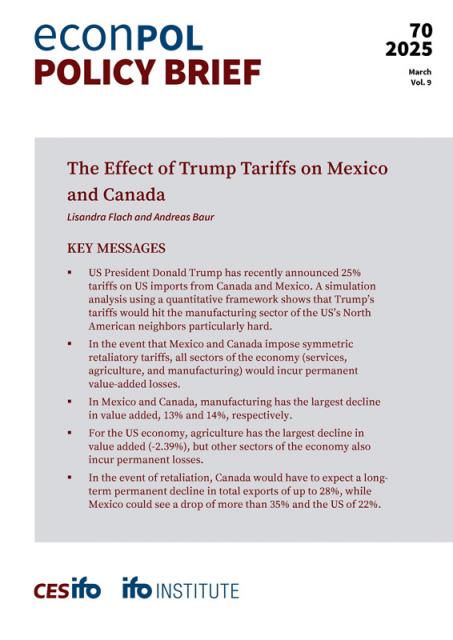News Archive

Rise of Populism: Causes, Consequences and Policy Implications?
|
EconPol Forum
| News
Populism is on the rise. Donald Trump's presidency in the US and the Brexit referendum campaigns are two prominent examples in recent years. Several EU member states, namely France, Italy, Spain, Portugal, Hungary, Greece, Austria, the Netherlands, Sweden and Germany, have experienced how quickly populists can win over voters in national elections. With the U.S. presidential election and the European elections in 2024, many people fear a further rise in political polarization and populism in the Western world.

Economic Causes for the Rise of Populism
|
EconPol Forum
| News
In recent years, radical right-wing political groups and populist movements have gained popularity in many Western democracies. In a new EconPol Forum article, Florian Dorn, David Gstrein and Florian Neumeier summarize the existing literature on the extent to which economic factors contribute to the rise of populism. In particular, right-wing extremists gain votes in regions where the risk of poverty increases.

Where Europe’s Energy Policy Should Go
|
Policy Report
| News
Economic researchers from various countries have called on the EU to view the energy crisis following the Russian attack on Ukraine as a wake-up call and to strive for better cooperation in Europe. “Not only can switching to non-fossil energy sources reduce strategic dependency: if done correctly, it can also lower electricity prices and help the EU and its member states achieve their climate targets. Further integration of the European electricity markets and gas grids is essential in order to better balance out regional shortages,” they write in new EconPol Policy Report.

Climate Policy Priorities for the Next European Commission
|
Policy Report
| News
From the earliest announcement of the European Green Deal, the current EU political cycle has been defined by an unprecedented acceleration in the scale and pace of climate policy. Under difficult conditions that sometimes tested the ability to engage stakeholders, including various external shocks, the EU has put forward and largely passed an unprecedented legislative agenda, which was meant to have, and is having, deep impacts on the EU economy and society at large.

Climate Policy Priorities for the Next European Commission
|
Event
| News
The European Roundtable on Climate Change and Sustainable Transition (ERCST) and EconPol Europe are pleased to invite you to the launch of their report on “Climate Change Policy Priorities in the Next EU Political Cycle”. This initiative is designed to identify and examine core issues and provide recommendations for EU Institutions in the development and implementation of climate change policies post-2024 EU elections.
